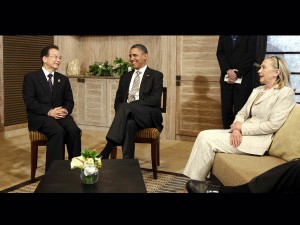Obama, Chinese premier discuss economic topics
BALI, Indonesia—President Barack Obama and Chinese Premier Wen Jiabao conferred Saturday in a surprise meeting on the sidelines of a major Asian summit, focusing on the economic matters that have prompted disputes between the two major world powers.

US President Barack Obama meets with Chinese Premier Wen Jiabao as US Secretary of State Hillary Rodham Clinton is seated at right on the sidelines of the East Asia Summit in Nusa Dua, on the island of Bali, Indonesia, Saturday. AP
The session was not a formally planned moment of diplomacy but rather a late add-on to let the two men continue their conversation from a group dinner the night before.
“We have a very complicated and quite substantial relationship with China across the board,” White House National Security Advisor Tom Donilon told reporters after the session.
“We do have economic issues. They are around the proper contribution that the Chinese make to global growth and that goes to currency and other policies,” he added.
He said Obama stressed the importance of China adjusting the value of its currency, which the United States contends is deeply undervalued. But Donilon also downplayed tensions between the two powers, saying they also have found vast areas of agreement.
The meeting came on the last leg of Obama’s nine-day Asia-Pacific trip, in which he has focused on bulking up America’s presence in the region, including setting up a Marine task force in Australia, in moves largely seen as hedges against China’s rise. The US also played up a trade partnership with Asian and Pacific Rim countries that did not include China.
Article continues after this advertisementThe last-minute meeting underscored the significance of China in the US eyes, however. Obama met with Chinese President Hu Jintao just last weekend in Hawaii for an Asia-Pacific economic summit.
Article continues after this advertisementOnly photographers and a videographer were allowed in at the start of the meeting with Wen, where the two men exchanged small talk.
A commentary run by the official Xinhua News Agency on Saturday suggested China was uneasy but not alarmed over the renewed US focus on Asia.
“Actually, China as well as other Asian nations never considered the United States had left the Asia Pacific and had never tried to squeeze it out of the region,” said the piece, which carried the headline, “US ‘return’ to Asia raises more questions than can answer.”
The commentary noted that the US was trying to court some Asian countries, a clear nod to recent US overtures toward Myanmar, and was interfering in long-standing regional disputes, an apparent reference to US military support for the Philippines as it confronts China in increasingly tense territorial disputes in the West Philippine Sea (South China Sea).
“If the United States sticks to its Cold War mentality and continues to engage with Asian nations in a self-assertive way, it is doomed to incur repulsion in the region,” it said.
China has been angered by the US stand that it has a stake in security and unhampered international commerce in the disputed territorial waters of the West Philippine Sea. Wen had told a meeting of Southeast Asian nations on Friday that “external forces should not use any excuse to interfere” in territorial disputes in the sea.
China claims all of the sea, while several Southeast Asian nations claim parts.
Donilon said the United States, as a maritime power, wants territorial disputes resolved peacefully.
“We do believe they should be resolved in accordance with international norms and international law,” he said.
Wen’s portfolio, though, is chiefly economic, and that is where his conversation with Obama focused, Donilon said. The United States and China have been tussling not only over China’s currency, but over intellectual property. Obama has been challenging China to operate with a greater sense of international rules.
Donilon rejected suggestions that Obama’s trip was designed to thwart a rising China. The US policy, he said, was about rebalancing US interests and focusing once more on the Asia-Pacific region.
“This has nothing to do with isolating or containing anybody,” he said.